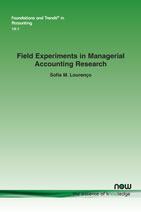Field Experiments in Managerial Accounting Research
By Sofia M. Lourenço, ISEG, Universidade de Lisboa, and Advance, CSG Research Center, Portugal, slourenco@iseg.ulisboa.pt
Abstract
The use of field experiments in managerial accounting research has increased substantially in the last couple of years. One reason for this upsurge is the call in the literature to address causality more confidently, which can be best accomplished with field experiments. This research method provides a clear mechanism for identifying causal effects in the field because the researcher introduces exogenous manipulations in different experimental conditions to which observational units (e.g., individuals, groups, or companies) are randomly assigned. Hence, field experiments are well suited to address managerial accounting phenomena that are plagued with endogeneity concerns when analyzed by using the results of retrospective (observational) studies. This manuscript provides an introduction to field experiments and is especially directed toward managerial accounting researchers who wish to consider adding this research method to their toolbox.
Field Experiments in Managerial Accounting Research
Field Experiments in Managerial Accounting Research is a comprehensive review of this topic. Field experiments promise to be a useful method in managerial accounting research, not only because they allow making causal claims with confidence, but also because they permit researchers to answer a set of research questions in the field that were not possible before. After a brief introduction, section 2 discusses causal inference and section 3 describes the experimental method. Section 4 discusses the promise of field experiments for managerial accounting research and section 5 provides examples of field experiments in this stream of the literature. Section 6 presents some guidelines for running field experiments and section 7 presents the limitations of this method. Finally, section 8 provides a conclusion.
